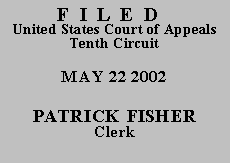

| CECIL WAYNE HALLMARK, |
|
| v. | |
| TOM MARTIN, Warden, Great Plains
Correctional Facility,
Respondent - Appellee,
|
Petitioner Cecil W. Hallmark was convicted of the following offenses in an Oklahoma state court: (1) first degree rape; (2) first degree burglary; (3) attempted rape in the first degree; and (4) sexual battery. On direct appeal, the Oklahoma Court of Criminal Appeals ("OCCA") issued an opinion concluding that Mr. Hallmark's convictions for attempted rape and for sexual battery violated the constitutional prohibition against double jeopardy. Accordingly, the OCCA remanded the case to the trial court with instructions to dismiss those convictions.
The OCCA further concluded that the trial court had erred in failing to order a presentence investigation. The OCCA thus directed the trial court to resentence Mr. Hallmark on the rape and burglary convictions after the completion of the presentence investigation. On remand, the trial court conducted the investigation and then imposed consecutive sentences of seventy-five years and twelve years on Mr. Hallmark's two remaining convictions.
After exhausting his state court post-conviction remedies, Mr. Hallmark filed the instant habeas corpus petition in federal district court on June 13, 1997. He asserted the following claims: (1) that he received ineffective assistance of counsel at trial; (2) that the state trial judge incorrectly answered a question raised by the jury during deliberation; (3) that there was insufficient evidence to support his convictions; (4) that he received ineffective assistance of counsel on direct appeal; (5) that the trial court failed to properly instruct the jury on the elements of first degree burglary; (6) that the trial court erred in refusing to suppress testimony regarding the victim's identification of Mr. Hallmark on the night of the crime; and (7) that the prosecutor engaged in misconduct. The district court rejected all of Mr. Hallmark's claims, and he then sought to appeal that decision to this court.
In a prior order we granted Mr. Hallmark's application for a certificate of appealability as to certain issues arising out of Mr. Hallmark's claim that he received ineffective assistance of counsel in his direct appeal. We denied Mr. Hallmark's application for a certificate of appealability on his other claims. We also directed the parties to supplement the record with the jury instructions from Mr. Hallmark's trial.
Our grant of a certificate of appealability was based on Mr. Hallmark's allegation that his appellate counsel failed to challenge the jury instructions pursuant to Flores v. State, 896 P.2d 558, 562 (Okla. Crim. App. 1995). See Aplt's Br. at 7. In Flores, the OCCA considered a jury instruction that stated that the defendant was "presumed to be not guilty" rather than "presumed innocent." 896 P.2d at 562. The OCCA concluded that the instruction did not properly explain the presumption of innocence, and it therefore reversed the conviction. Id. Mr. Hallmark maintains that the trial court gave a similar instruction in his case and that appellate counsel was ineffective for failing to challenge the instruction pursuant to Flores.
Our review of the jury instructions (contained in the supplemental record filed with this court on March 11, 2002) reveals that the trial court here did not instruct the jury that Mr. Hallmark was "presumed to be not guilty," as did the trial court in Flores. In particular, instruction number four states that "[t]he defendant is presumed innocent of the crime, and the presumption continues unless after consideration of all the evidence you are convinced of his guilt beyond a reasonable doubt." Supp. Rec., Instr. no. 4 (emphasis added). Accordingly, Flores does not provide a basis for challenging the jury instructions, and Mr. Hallmark's appellate counsel was not ineffective for failing to raise that issue.
Accordingly, we AFFIRM the district court's denial of Mr. Hallmark's claim for ineffective assistance of appellate counsel.
Entered for the Court,
Robert H. Henry
Circuit Judge
*. This order and judgment is not binding precedent, except under the doctrines of res judicata, collateral estoppel, and law of the case. The court generally disfavors the citation of orders and judgments; nevertheless, an order and judgment may be cited under the terms and conditions of 10th Cir. R. 36.3.